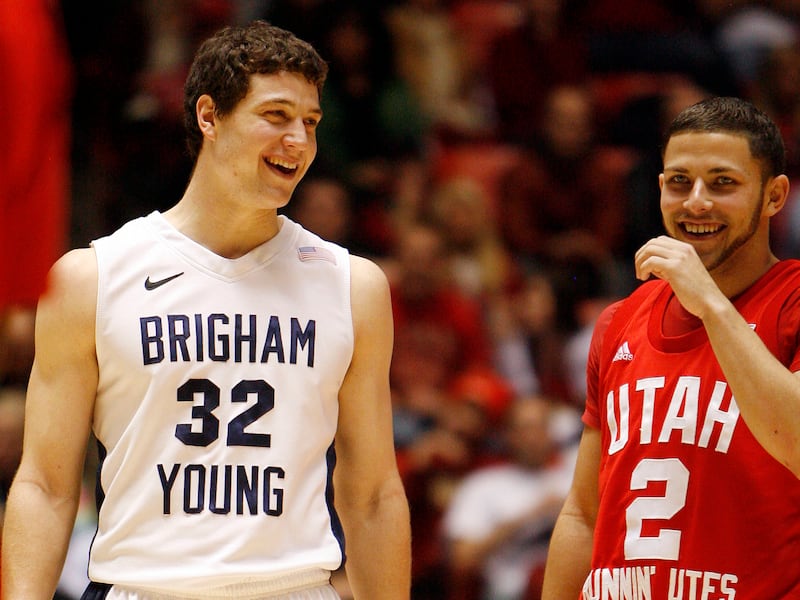If anybody in the history of BYU sports could have capitalized on name, image and likeness initiatives, it would have been Jimmer Fredette.
The 2011 consensus National Player of the Year was a household name as a senior, when “Jimmermania” swept the country. Fredette averaged 28.9 points per game in front of sellout crowds, knocked down 124 3-pointers, saw his first name become a verb (“Jimmered”), scored a school-record 52 points in a single game, became BYU’s all-time leading scorer (dethroning the legendary Danny Ainge), and led the Cougars to a No. 3 ranking at one point as well as an appearance in the NCAA Tournament’s Sweet 16 for the first time in 30 years.
That season, wherever Fredette went, he treated like a rock star as he mesmerized observers with his ability to hit difficult, seemingly ill-advised shots from all over the court. Fans wanted his autograph or a chance to take a picture with him or talk to him. He had to stop attending classes in person and do his schoolwork online. Everybody wanted a piece of him.
Fredette became a pop culture icon of sorts. He appeared on magazine covers. The media, both local and national, chronicled his every move. His older brother wrote a rap song about him and Lil Wayne name-dropped Jimmer into a rap.
But there was more.
NBA superstar Kevin Durant tweeted that Fredette “is the best scorer in the world!!” President Barack Obama gushed over him. “Have you had any kind of chance to see Jimmer Fredette from BYU?” he said during that 2011 season. “Unbelievable. Best scorer obviously in the country. Great talent.”
Now that the NCAA, as of Thursday, allows student-athletes to benefit from their name, image and likeness, they will have the opportunity to be compensated in ways Fredette never was.
“It’s definitely a great ruling. It needed to be done. College athletes needed to be paid at some point, somehow. And I think this is the best way to do it, honestly, in my opinion,” Fredette told BYU Sports Nation Thursday morning. “They can go out and make money on their name. Now they do stuff on social media and make money, they can do endorsements with local car dealerships or whatever it is, the Sodalicious down the road, whatever it is. They’re going to be able to make some money, which is amazing.”
Imagine what Fredette could have earned at BYU under this new legislation.
“If I had that opportunity to do that, it probably would have been pretty good for me. I had a lot of people that were trying to come to me and make money off of me anyway from that time period and I wasn’t able to capitalize on that, obviously,” he said. “But now the kids are and I think it’s a great thing.
“I’m sure that all of the college students that played in previous years are like, ‘Yeah, I was born a little bit too early.’ I think it’s a great thing for the kids now and hopefully they can capitalize on it.”
Of course, there are plenty of unknowns regarding NIL. Will opportunities to earn money be a distraction for student-athletes?
“At first, probably, a little bit just because it’s new. Anything that’s new is something that you have to get used to. It’s a little bit different and you have to schedule your time differently. But I think the kids will be able to prioritize their time and be able to understand that the first thing they need to do is win on the court and they need to perform on the court,” Fredette told BYU Sports Nation. “If they don’t do that, they’re not going to get the endorsements anyway. They won’t be able to get those off-the-court opportunities.
“So I think first and foremost their coaches will definitely make sure that they understand that. They’re not going to miss any practices or meetings or anything like that. I promise you that,” he continued. “They’re going to be doing this (NIL-related activities) later on at night or early in the morning, whenever it is that they can provide time on a day off or something.
“It will definitely be a little bit different to schedule at first but they’ll figure it out. They’re very intelligent people, they know what they’re doing. A lot of the coaches, like (BYU) coach (Mark) Pope, has dealt with that in his career before so he knows what that’s all about. He will be able to facilitate that and Kalani (Sitake) and all the coaches at BYU will be able to do the same. I think it will be OK. But it will be an adjustment at first.”
Nobody knows what Fredette’s earnings potential as a student-athlete could have been at BYU.
While he missed out on those opportunities, Fredette is happy current and future athletes will have a chance to market their talent in ways he couldn’t.


